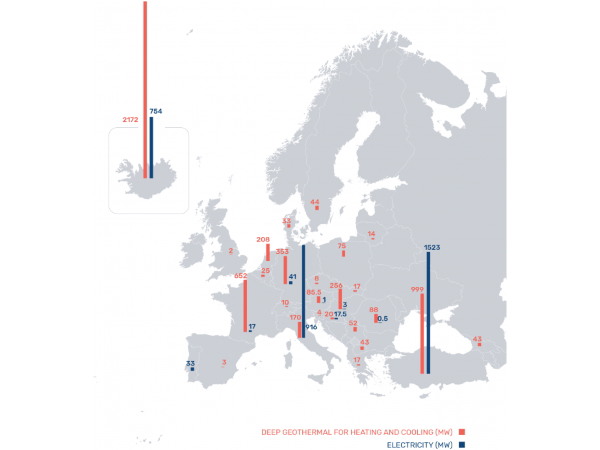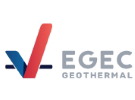In Europe, the geothermal energy market has been growing fast in 2019, but the policy framework has been proven crucial in affecting its development. These findings come from the European Geothermal Market Report 2019 published today by the European Geothermal Energy Council (EGEC).
At the end of 2019, in Europe there were 130 geothermal electricity plants in operation, 36 projects under development and 124 projects in the planning phase for a total 3.3 GWe capacity. This predicts that the number of operating power plants, with base load, could double in the next 5-8 years.
Europe is a leading market for geothermal district heating and cooling systems. In 2019, there were 5.5 GWth of installed capacity in 25 European countries, with many new planned projects throughout Europe compared to 2018. The status of geothermal district heating and cooling reflects a stronger interest for this renewable resource and the possibility to implement it almost everywhere in Europe, covering 25% of the EU population. The trend of ongoing projects anticipates a rapid acceleration and a diversification in leading markets.
 © EGECInstalled capacity for geothermal electricity and district heating by country in 2019 (MW)
© EGECInstalled capacity for geothermal electricity and district heating by country in 2019 (MW)
In 2019, the European geothermal heat pump market reached a milestone of 2 million heat pumps installed. The technology became mainstream in certain national markets, proving its maturity to drive the shift of the heating sector to renewables.
Overall, the use of geothermal energy can scale up very rapidly with the right policies and market conditions: stable policy framework, proper insurance schemes, sound Research & Development & Innovation policies, carbon price and stopping the support for fossil fuels, including gas.
On the contrary, the stop-and-go policies witnessed in certain countries (notably Germany and France) represent a huge disruption for geothermal technologies, hinder the market and ultimately slow down the uptake of urgently-needed solutions to decarbonise the European economies.
Philippe Dumas, EGEC Secretary General, said “Geothermal energy is sparking enthusiasm throughout Europe, and not only for heating and cooling in buildings and infrastructures, but also for industrial processes and agriculture. New opportunities are arising with the extraction of sustainable geothermal lithium made in Europe. With so many different applications, vast untapped potential and the high growth rates of the last years, geothermal energy is bound to become the bedrock of energy transition. 2020 to 2030 will be the “Geothermal Decade”. Suitable European and national policy frameworks can and should encourage this trend if European countries are serious about becoming zero-carbon by 2050.”
For more information: European Geothermal Energy Council
European Geothermal Energy Council
www.egec.org
